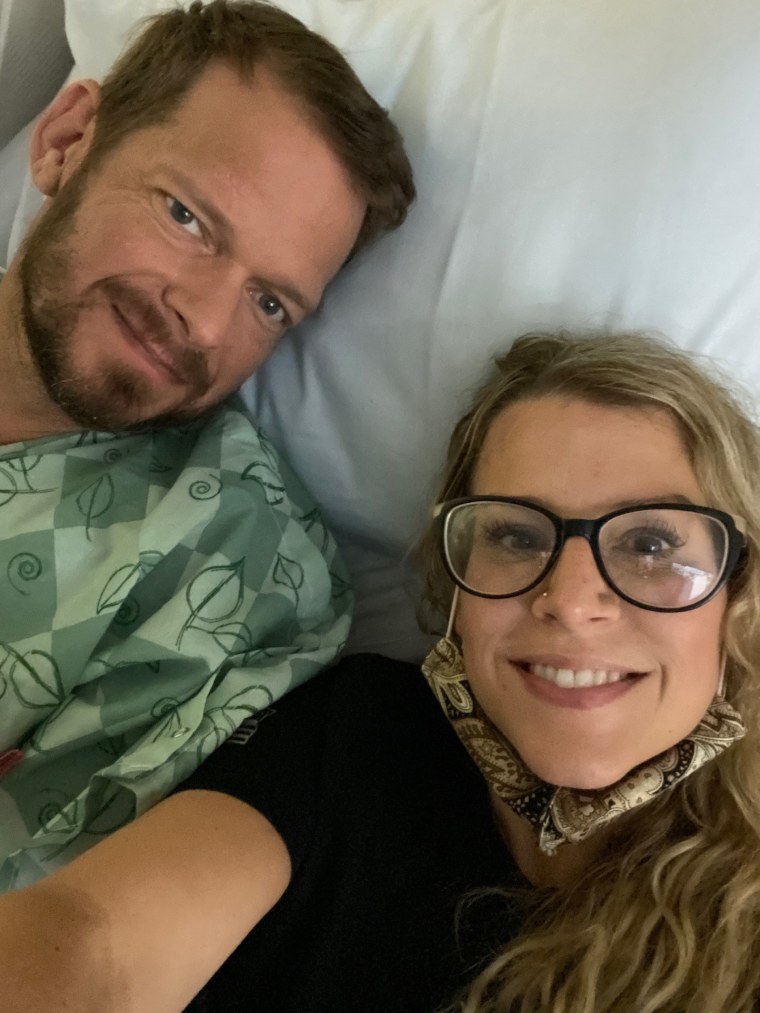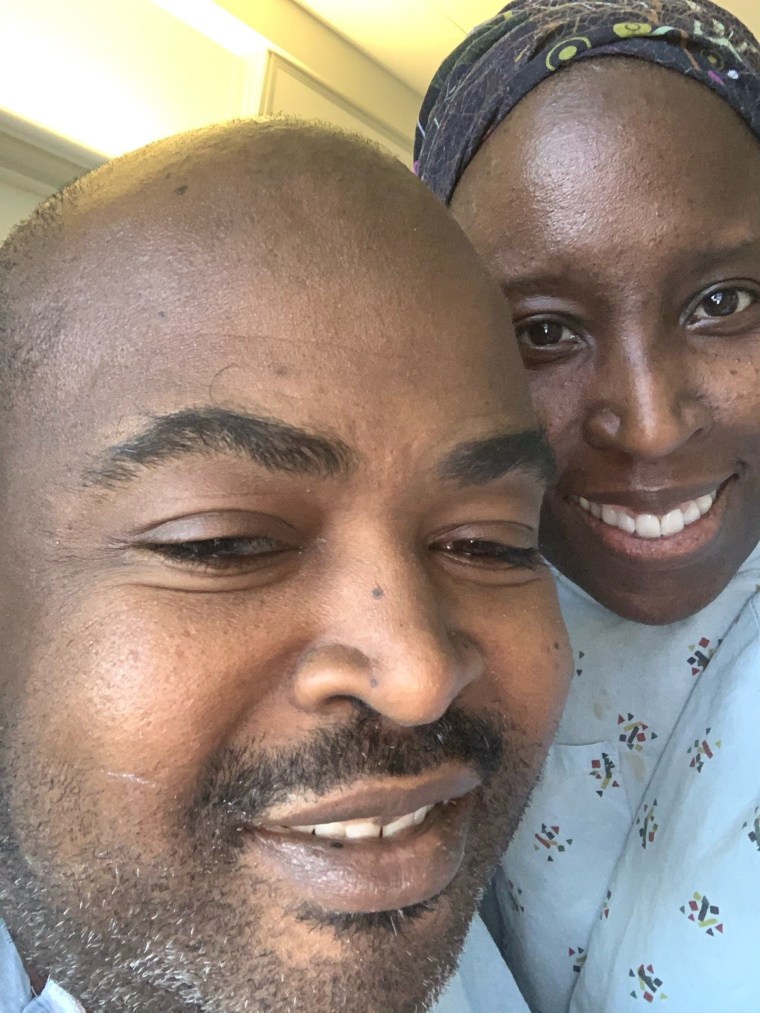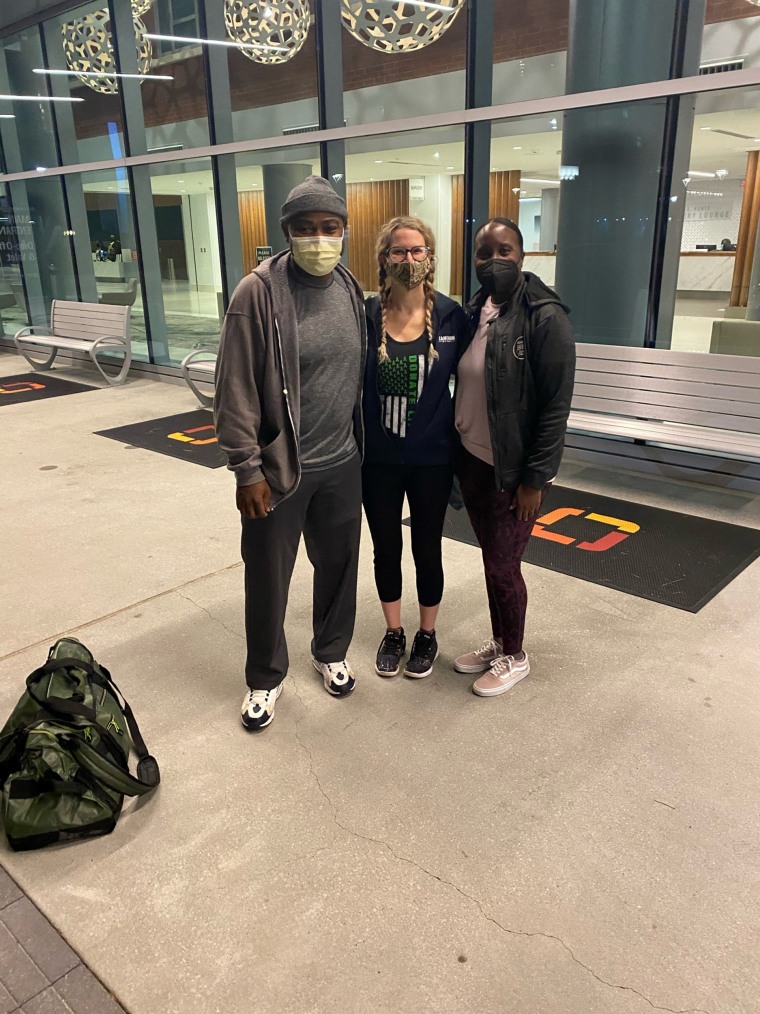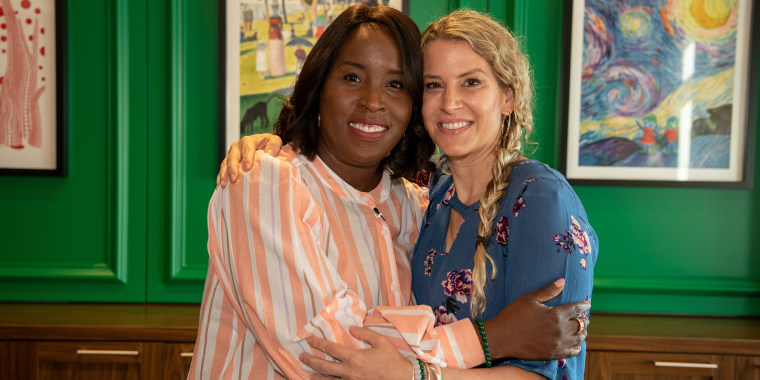For a year, co-workers Susan Ellis and Tia Wimbush supported each other as their husbands grappled with kidney failure and being placed on the transplant list. When the colleagues were chatting in a bathroom one day, they realized they might be able to help the other’s husband.
“We were in that mindset of going through the donation process and looking for matches for our husbands, hoping we could be it,” Wimbush, 45, who works in the IT department of Children’s Healthcare of Atlanta. “We said, ‘Why not? Why not move forward and see if we could potentially help each other’s family?’”
Supporting each other
In 2019, Wimbush’s husband, Rodney, 45, was diagnosed with kidney failure and chronic kidney disease because of undiagnosed high blood pressure.
“That caused a deterioration of his kidney function,” Wimbush explained.
Ellis’ husband, Lance, 41, had kidney problems for more than a decade. When he turned 30, he rushed to the hospital when he thought he was having a heart attack. Doctors learned he instead had IgA nephropathy, a type of kidney disease.
“The filters in (his) kidney had … deteriorated so his body was no longer filtering anything,” Ellis, 42, who also works in IT at Children’s Healthcare of Atlanta, told TODAY. “He went through his first kidney transplant in 2017. His mother donated her kidney and unfortunately, that kidney didn’t hold up.”

In 2019 when the Wimbushes learned of Rodney’s renal failure, doctors discovered Lance was also in renal failure. Both men were receiving dialysis and would need a kidney transplant. That’s how the women started their friendship — Ellis’ manager connected the two because of their shared circumstances. For a year, they boosted each other’s morale.
“We were already helping each other out, just being comforters and supporters,” Ellis said. “We bounced ideas off of each other and just really listened.”
In October 2020, the two bumped into each other in the bathroom and started gabbing. They soon realized they could do more than listen.
“My husband had just made it onto the transplant list and so I was asking Susan about that process,” Wimbush said. “She mentioned that she and her husband, Lance, were not a match. I asked her ‘What’s his blood type?’ and she said, ‘O negative.’ And, I knew that I’m O positive and that I could be a potential match.”
What’s more, Ellis’ blood type was A, which meant she could possibly donate to Rodney. Wimbush thought she could also be a donor for her husband, but helping her friends felt right.
“We really felt strongly about trying to do this as a partner match,” Wimbush said. “This was a divine moment. We were all here at this moment, at the exact same time, in the same place, going through the exact same thing. What were the chances that we weren’t meant to help one another?”

Both doctors evaluated the women to make sure they were physically and mentally healthy enough to donate. Then they underwent antibody testing to avoid organ rejection.
The surgery was first scheduled in December, but Lance had a blood clot on his brain and spent time in the intensive care unit while the transplants were postponed. Then in January, Ellis caught COVID-19 and that pushed the transplant back again.
After supporting each other for so long, they again relied on their friendship.
“We had to lift one another up, talk to one another, keep each other sane because it was really difficult,” Wimbush said. “This was really our husbands’ chance at getting a better quality of life.”
On March 19, 2021, the surgeries finally took place. The friends have already seen changes in their husbands.
“Dialysis takes so much out of you. It is purifying your body and acting as your kidneys, but it also drains you and makes you feel like you’re imprisoned,” Ellis said. “They’re thriving spiritually, faithfully, physically, mentally.”
Wimbush agreed.
“The change is dramatic,” she said. “They are able to show up for us now.”
Living donation
“It’s hard to say this but I’m not sure Lance would have made it another year. He was slowly deteriorating, had enormous co-morbidities that were going along with his kidney disease and the dialysis,” Ellis said. “He was just withering away. So this was truly something that needed to happen quickly.”
While many donated organs come from people who have died, living donors can provide a kidney or a part of their liver to people who need them. According to Donate Life America, more than 100,000 people are waiting for an organ transplant and more than 85% of them need a kidney. About 11% of the people waiting need a liver. Both Wimbush and Ellis, who had their kidneys removed with laparoscopic surgery, said that they started feeling a little better after three weeks, and returned to work in May.
They two hope their story shows how easy living donation is and how important it is for people to donate.
“You hear that word (donation) and you think, ‘I’m living, how can I donate? How can I live without an organ?'” Ellis said. “(The transplant team) makes sure you’re healthy enough to receive (an organ) and healthy enough to donate.”

And, they added that living donation makes a tremendous impact.
“You can change a person’s life,” Wimbush said. “(It’s) about kindness and connecting with people and answering the call when you get that little voice that nudges you to help.”
Related:
